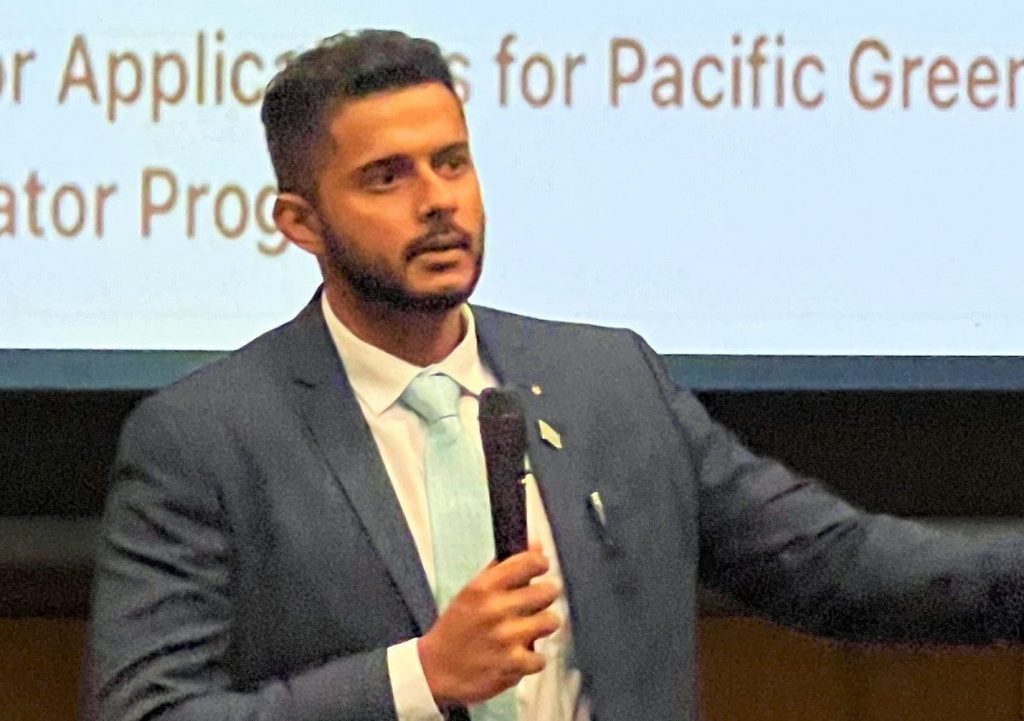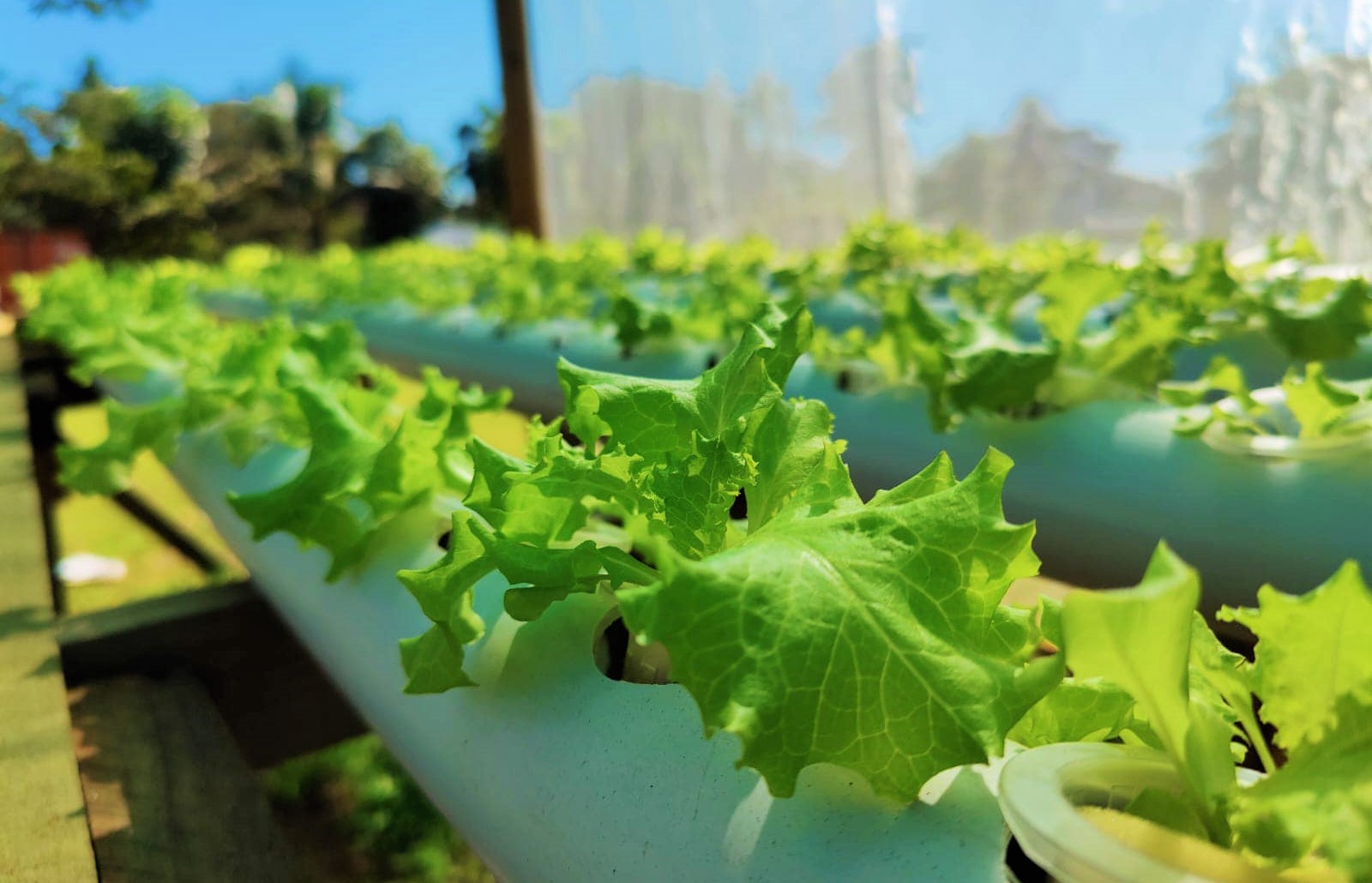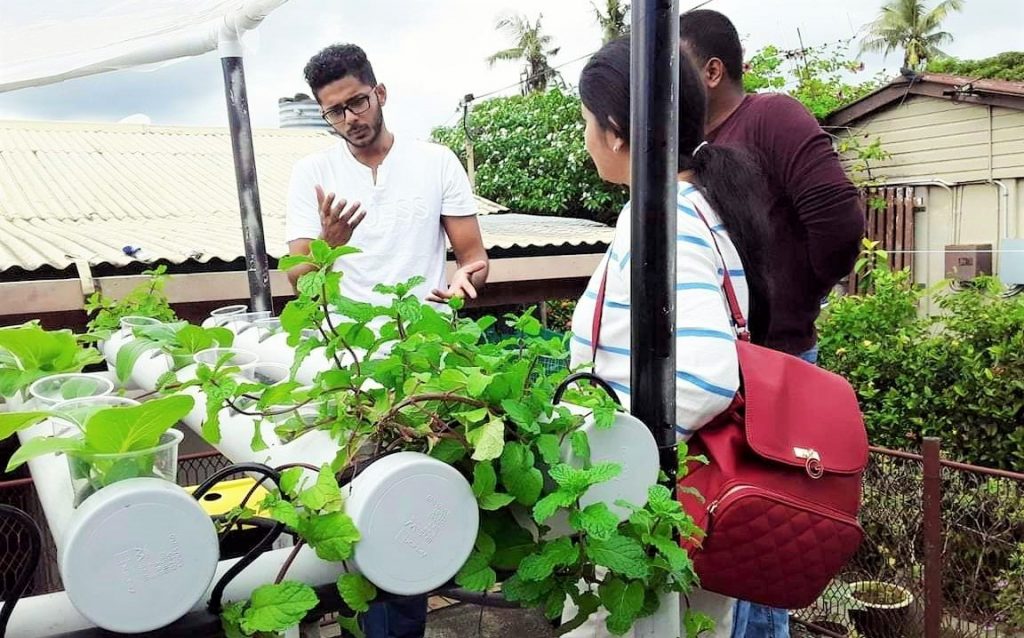Rinesh Sharma: Smart Farms

By Sera Tikotikovatu-Sefeti
Entrepreneur and new parliamentarian, Rinesh Sharma, is a 29-year-old with a desire to make a difference in his community. He is no stranger to failure, hard work, or the agricultural landscape. But his entrepreneurial mindset and passion for farming are what drives him.
“What really helped me was that at that age of 21, I was wholesaling products to farmers, and when I sit with them, I hear the challenges in agriculture,” he told eager students and entrepreneurs at the University of the South Pacific recently.
These conversations with farmers were in the back of his mind when he finally got into engineering. He said, “I knew the problem, so I was trying to devise or engineer a solution.”
The young entrepreneur set up Smart Farms Fiji which delivers technology to help farmers, particularly in unpredictable climatic conditions. The concept was birthed through a final project undertaken as he studied engineering in India. As a software engineer, he specialises in automated and digitalised climate farming mechanisms.

“I decided to automate a greenhouse because in Fiji we are seasonal growers and we always suffer because of what the climate throws at us,” Sharma said.
“If we automate a greenhouse, we can have seasonal control of farming, and we can have the veggies and supplies,” he said, adding this can contribute to food security.
For his final engineering project he built a device that can automate a greenhouse “without blowing anything up, then I created an app where on my phone I could see the humidity, temperature, and soil moisture, while also controlling the water pumps or lights in the farm.”
Sharma’s innovation allows the farmers to access their farms with a click of a button. But getting there was not without difficulty.
“One of the challenges was to educate the public, but knowing what to educate about is difficult because when it is an innovative product, people are in their comfort zone and say, ‘Why should we have something new?’ So you have to educate and then sell.”
He adds, “The initial setup cost was pretty high as well, because you are replacing the natural sun, then you have to control the climate in the greenhouse.”
He was told that others had approached the Fiji Development Bank with similar concepts, and the challenge was the high upfront cost. “One of the managers told me that they had been discussing a very similar project of container farming, in particular strawberries, and creating value; so they just had the idea of growing strawberries in a farm, but they did not talk about creating value, like Fijian-made or Fijian-grown strawberry jam,” he said.
Adding value to a product can be what sets a business apart. In Sharma’s case, he added value through training.
“I realised, you can have the best technology in the region, but if you don’t cultivate the mindsets of people to be farmers, who is going to operate the technology?”
With the help of the United Nations Development Programme (UNDP), Sharma was able to reach and train over 13,000 people, both in person and virtually over the past 4.5 years, almost three-quarters of them women.
It was all going well until a double calamity caused by COVID-19 and Cyclone Harold destroyed his farm and derailed his progress. “Cyclone Harold ripped my farm apart,” Sharma recalls.

Support arrived in the form of the Bill and Melinda Gates Foundation.
“Despite those calamities, we were the first five in the world to get a COVID response funding from Bill and Melinda Gates Foundation.
This was to help fortify homes, so from an entrepreneurial perspective, I saw a bigger picture, working with multiple communities in Fiji,” Sharma said.
He has also responded to the market and environmental demand for minimal pesticide use.
“I started to farm in Rakiraki…With two acre of field, and plenty of jungle this high (gesturing to hip-height) an agriculture specialist advised me, saying I can use gasification to take out the weeds in my two acre field,” he said.
That got him thinking. Preparing to grow kumala (sweet potato) he observed, “When you look at the back of the pesticides [packaging], it gives warning labels: if it enters your eyes, wash it off, or [if you] ingest it, go see a doctor. So why would you put that on your soil and plant the food that you will eventually have to eat?
“We use technology, recycle, and repurpose, I think that is the way forward.”
At the recent USP Annual Entrepreneurs Fair, his advice to farmers came from his observation of dalo farmers; “You can be the best farmer, but if you don’t know how to sell, there is no point,” continuing, “I have worked with many farmers, and I have seen that the middleman takes advantage; farmers sell at very low prices, and the middleman sells at very high prices.”
He also shares a natural pesticide recipe that his 82-year-old grandmother uses.
“She would get a 200-litre drum, fill it up with neem leaves, dump some chillies, and blend it, that is our organic pesticide”, he said. “Farmers can also use fine white netting to stop insects from invading their crops.”
He encouraged entrepreneurs to consider the following:
- If you want funding and value from donors, use language that is meaningful to them, e.g., use recycling, involve the community members, empower the people, incorporate mitigation, adaptation, resilience, climate resilience, and sustainability into your plans, and it will be more sellable.
- Farmers need to understand how to sell their produce, not only growing it but also selling it. According to Sharma, farmers are often taken advantage off by middleman who buy at cheaper price from farmers and hike the price up. This way they are able to get the maximum benefit out of their produce.
- You will have mountains, it will humble you and make you more patient. You will have to go around, underneath, and through those mountains, and it is never easy, so go through the struggles, and once you reach your threshold, you hustle.
- Look at all the government pages for initiatives that support your MSME. I would encourage you to go through FDB , YES Initiative, Pacific Greenpreneurs incubator program , etc.
- Criticism is a huge part of success, when you know your own flaws and work to improve them. No one from outside can deter your road to success.
- In any competitive environment, be prepared to work hard and struggle.
- Success is an iceberg, you need to be persistent, dedicated, work hard, be disciplined, and disappointment, sacrifice, and failure are all part of the package.
Wrapping up, Sharma said:
“Success is never owned, because it is an integrated process in which everyone you meet has played a part—someone processed your application, someone approved scientific documents.
“But for me, success is never owned; I can never say I’m self-made. I may be the driver, but if it wasn’t for my customers, who would I sell my products to? Success comes from your challenges; let them humble you.”

